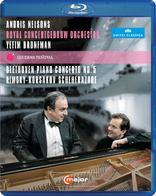
Beethoven: Piano Concerto No. 5 / Rimsky-Korsakov: Scheherazade Blu-ray Review
Could you ever imagine someone like Arturo Toscanini or Leonard Bernstein or Seiji Ozawa breaking into song? Of course it's not out of the realm of possibility, and indeed there's video footage of at least two of these men "singing" (if that's the appropriate term) little snippets of score as they either rehearse their respective orchestras or talk about a given piece for an interview. But actually perform a song? It's a brave new world for conductors, though, albeit one that may have been hinted at for years by other conductors who matriculated to the podium from other artistic pursuits. Many conductors from as far back as at least the 18th or 19th century have started as instrumental virtuosos and ended up leading orchestras, but for some reason singers have more rarely made the same trek. The Latvian sensation Andris Nelsons came from an especially musically proficient family, with both of his parents essaying different roles in Latvian musical life. His mother founded the first early music ensemble in the nation and his father was a choral conductor and instrumentalist of some note (no pun intended). But it was opera that first really spoke (and/or sung) to Nelsons, and despite an early facility with the trumpet, Andris envisioned a life of singing as a bass-baritone. Although online information about this nascent singing career is sparse, according to the liner notes included with this new release documenting Nelsons' September 2011 performance at the Lucerne Festival, he was rather successful in his initial career before deciding that conducting was more interesting. This career change was facilitated by another Latvian conductor, the iconic Mariss Jansons, another man who grew up in a musically proficient family (perhaps even more so than Nelsons, since Jansons' own father was a famous conductor). Nelsons has obviously learned his lessons well, and despite being still relatively young (he was born in 1978), he is already enjoying the kind of burnished reputation that used to take considerably more time and experience to achieve.
 淘宝店铺:http://94hd.taobao.com
淘宝店铺:http://94hd.taobao.com